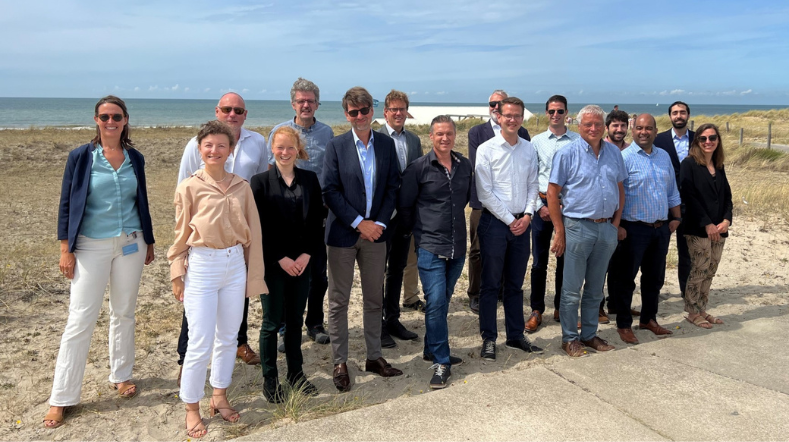TNO’s next generation biorefinery accelerates material transition
Biomass plays a crucial role in the material transition to a circular and biobased economy. The benefits of biomass go beyond sustainability alone. The benefits not only offer sustainability but also greater self-sufficiency and reduce dependence on fossil resources outside Europe. Biomass residues are available throughout Europe. Moreover, fossil fuels will eventually run out, making it important to take steps towards sustainable alternatives now. TNO and partners are developing the Fabiola technology, which enables this transition by converting biomass into valuable products such as lignin, thereby reducing dependence on fossil fuels.
Breakthrough in the material transition
Although biorefining offers many benefits, there are still challenges. Many biorefining technologies are still in development and focus on a limited number of biomass streams. Moreover, the quality of the green building blocks often does not meet industrial requirements.
Therefore, TNO and partners have collaborated to cost-effectively isolate high-quality building blocks such as cellulose fibers, sugars, and lignin. Lignin, consisting of aromatic building blocks, can be used for products such as adhesives, coatings, paints, and polyurethane foam. Thanks to Fabiola, 75-80% of the lignin can be extracted from biomass, with much higher quality than before.
“The advanced technology Fabiola, developed by TNO to cost-effectively isolate high-quality green building blocks from biomass, is ready to be put into practice. A demonstration biorefinery processing up to 1 million kilos of biomass per year would be a significant step in accelerating the material transition,” says Arjan Smit.

'It is important that we start building this capacity now if we want to meet climate goals.'
Advanced biorefinery at demonstration scale
“We are working to apply this successful separation technology on a larger scale in a demonstration biorefinery, which can process up to 1 million kilos of biomass per year. This plant will be a ‘proof of concept’ for commercial feasibility and can serve as a blueprint for future large-scale biorefineries in Europe,” according to Smit.
“A demonstration plant can convert 80-95% of biomass waste into green building blocks for high-quality materials and flexibly process various types of biomass streams from waste flows. This is significantly more efficient than other technologies. The improved process also consumes less energy and operates at a lower temperature, reducing costs and environmental impact.”
“The demonstration plant will initially focus on producing green building blocks for the construction sector. Biobased building materials are a rapidly growing market segment, especially now that European governments are committing to ambitious sustainability goals,” says Smit. “By 2030, 25% of materials in new buildings must be biobased. That requires a huge amount of green building blocks, and biorefineries can play a key role in that.”
Speed is essential
TNO’s work on such a demonstration biorefinery is an important step in the transition to a circular and biobased economy. The pilot plant has a processing capacity of 1 million kilos of biomass per year. That seems like a lot, but it is only a fraction of what is needed for a full transition. To meet future demand, dozens of much larger biorefineries would be needed.
Smit: “This scaling up takes time and money. Investments are needed, and it takes several years for a plant to become operational. Therefore, it is important that we start building this capacity now if we want to meet climate goals.”

'Together, we can ensure that biorefineries become the heart of the sustainable and circular economy of the future.'
Developing and building a circular and biobased economy together
Together with research institutes and universities, TNO is working on scaling up the Fabiola technology. Utrecht University contributed to the development of the process to produce high-quality lignin, and Fraunhofer tested the biorefining process on a pilot scale.
Smit: “We are looking for industrial partners to make Fabiola a success. The demonstration plant will serve as a growth core for new innovations and biobased products such as packaging, textiles, and bioplastics. This economic impact makes scaling up interesting for governments and market parties.
The path to a biobased economy has been set in motion, with TNO’s breakthroughs and innovations in biorefining forming a solid foundation. “We are at the beginning of a major change,” says Smit. “Together, we can ensure that biorefineries become the heart of the sustainable and circular economy of the future.”
Sustainable textile materials project
In the HEREWEAR project, in which TNO and partners collaborate, we focus on developing sustainable textile materials from residual biomass. TNO uses the Fabiola™ technology and fractionates residual biomass to produce the cellulose needed for the intended textile materials.
For example, the first dress made from wheat straw cellulose shows the potential of biobased materials in the fashion industry. This innovative project strengthens cooperation and innovation within Europe to accelerate the transition to a circular economy and demonstrates how biomass can be converted into high-quality, sustainable products. Other projects such as BIONTEER and HYPELIGNUM focus on developing biobased material composites and consumer electronics, respectively.
Get inspired
Local, circular, and biobased: towards the textile industry of the future with HEREWEAR


Renewable fuels


TNO develops method to produce biocarbon


New technology combines biocarbon production for industry with negative emissions

Producing renewable DME using renewable energy and CO2


